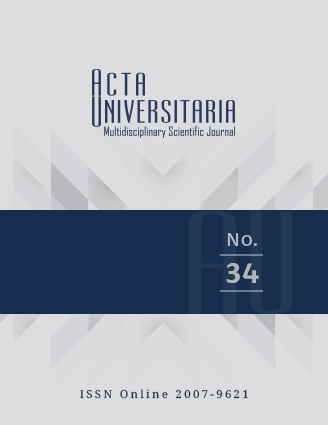Co-production of socio-environmental knowledge in the Sabana River-Tres Palos Lagoon sub-basin: a study of riparian space
Published 2024-10-16
How to Cite
Abstract
For more than 30 years, the socio-environmental problems of the Sabana River-Tres Palos Lagoon sub-basin have been extensively studied; however, problems in the area remain unresolved. The objective of this article was to analyze the role that government, society, and academia have played in the co-production of knowledge aimed at solving the socio-environmental problems in the sub-basin. A qualitative approach was used, where in-depth interviews and ethnographic analyses were carried out; the information collected was examined using the software Atlas.Ti. Results show that the forms of knowledge construction are based on vertical knowledge oriented to cover short-term political needs, but not towards an inclusive approach of local actors. We conclude that there are socio-political conditions that have been historically strengthened, hindering the processes of co-production of knowledge and citizen, academic, and political co-management aimed at solving socio-environmental problems in the territory.
References
- Acuto, M., Dickey, A., Butcher, S., & Washbourne, C. L. (2021). Mobilising urban knowledge in an infodemic: Urban observatories, sustainable development, and the COVID-19 crisis. World Development, 140, 105295. https://doi.org/10.1016/j.worlddev.2020.105295
- Al-Jarrah, T. M., Mansor, N., Talafhah, R. H., & Al-Jarrah, J. M. (2019). The application of metacognition, cognitivism, and constructivism in teaching writing skills. European Journal of Foreign Language Teaching, 3(4). https://doi.org/10.5281/zenodo.2531617
- Berger, P. L., & Luckmann, T. (1967). La construcción social de la realidad. Amorrortu Editores.
- Bourdieu, P. (2002). La mano izquierda y la mano derecha del Estado. Revista Colombiana de Educación, (42). https://doi.org/10.17227/01203916.5483
- Bremer, S., & Meisch, S. (2017). Co-production in climate change research: Reviewing different perspectives. WIREs Clim Change, 8(6), 482. https://doi.org/10.1002/wcc.482
- Brinkmann, S., & Kvale, S. (2018). Doing interviews. SAGE Publications.
- Covarrubias, F., Rodríguez, A. L., Galán, E. A., Ruz, M. I., & Reyes, M. (2022). La participación y gobernanza en la planeación urbana de Acapulco. Regions and Cohesions, 12(3), 110-133. https://doi.org/10.3167/reco.2022.120306
- Covarrubias, F., Reyes, M., Ruz, M. I., Galán, E. A., & Rodríguez, A. L. (2023). Diagnóstico urbano-ambiental empleando la cuenca hidrográfica como unidad espacial de análisis. Ciencia Latina Revista Científica Multidisciplinar, 7(6), 5422-5444. https://doi.org/10.37811/cl_rcm.v7i6.9089
- Creswell, J. W. (2012). Educational research: Planning, conducting, and evaluating quantitative and qualitative research (4th ed.). Pearson.
- Donoso, J. (2017). Reporte de investigación No. 2. Evaluación del proceso de implementación del Programa Nacional de Prevención del Delito (PRONAPRED) en Acapulco y su impacto en la reducción de violencia. IIEPA-IMA/UAGro.
- http://iiepa.uagro.mx/inicio/images/PROYEC-INVES/PUBLICACIONES/REPORTE2_FINAL_JAVIERA.pdf
- De la Torre, A. (2023). Socialización escolar y experiencia subjetiva de la desigualdad: Una aproximación teórica. Sinéctica, (60), 1-13. https://doi.org/10.31391/S2007-7033(2023)0060-009
- Dunlap, A. (2023). The green economy as counterinsurgency, or the ontological power affirming permanent ecological catastrophe. Environmental Science & Policy, 139, 39-50. https://doi.org/10.1016/j.envsci.2022.10.008
- Freidenberg, F. (2017). La otra representación: vínculos clientelares a nivel local en México. Andamios, 14(34), 231-258.
- https://www.scielo.org.mx/scielo.php?pid=S1870-00632017000200231&script=sci_abstract&tlng=pt
- Galán, E. A. (2020). Más allá de las percepciones: emergencia de subjetividades socioambientales en una región subcuenca de Acapulco, Guerrero. Clivajes, Revista de Ciencias Sociales, (14), 116-139. https://doi.org/10.25009/clivajes-rcs.v0i14.2667
- Galán, E. A., Rodríguez, A. L., & Rosas-Acevedo, J. L. (2021). Gobernanza hídrica como securitización socioambiental en la subcuenca La Sabana Tres Palos, Acapulco. Regions and Cohesion, 11(1), 49-72. https://doi.org/10.3167/reco.2021.110104
- Galán, E. A. (2021). Seguridad socioambiental. Hacia un programa de investigación desde una analítica de la gubernamentalidad. Espiral (Guadalajara), 28(82), 75-107. https://www.scielo.org.mx/scielo.php?pid=S1665-05652021000300075&script=sci_arttext
- Galán, E. A., Gómez, R. S., & Torres, R. (2020). Campos de acción estratégica, ambientalismo y participación en Acapulco, Guerrero. Revista Mexicana De Estudios De Los Movimientos Sociales, 5(1), 119-141. http://www.revistamovimientos.mx/ojs/index.php/movimientos/article/view/258
- González, J., Quiterio, A., Niño, N., Reyes, M., & Torres, G. (2012). Evaluación ambiental territorial de la cuenca Río La Sabana Laguna de Tres Palos. En M. Sampedro & J. González (Eds.), Calidad Ambiental y Desarrollo Sustentable. Indicadores (pp. 14-24). UAGro.
- Jagannathan, K., Arnott, J. C., Wyborn, C., Klenk, N., Mach, K. J., Moss, R. H., & Sjostrom, K. D. (2020). Great expectations? Reconciling the aspiration, outcome, and possibility of co-production. Current Opinion in Environmental Sustainability, 42, 22-29. https://doi.org/10.1016/j.cosust.2019.11.010
- Kano, H., & Hayashi, T. I. (2021). A framework for implementing evidence in policymaking: Perspectives and phases of evidence evaluation in the science-policy interaction. Environmental Science & Policy, 116, 86-95. https://doi.org/10.1016/j.envsci.2020.09.001
- Lahsen, M., & Turnhout, E. (2021). How norms, needs, and power in science obstruct transformations towards sustainability. Environmental Research Letters, 16(2), 025008. https://doi.org/10.1088/1748-9326/abdcf0
- McGrath, C., Palmgren, P. J., & Liljedahl, M. (2019). Twelve tips for conducting qualitative research interviews. Medical Teacher, 41(9), 1002-1006. https://doi.org/10.1080/0142159X.2018.1497149
- Moreno, I. D. (2017). La investigación social, un acercamiento a lo cotidiano. Revista Electrónica de Investigación Educativa, 19(4), 1-3. http://www.scielo.org.mx/scielo.php?script=sci_arttext&pid=S1607-40412017000400145&lng=es&tlng=es
- Moreno, J. C., Guzmán, S., & Patiño, M. (2023). Evolución y vigencia del constructivismo científico-tecnológico. Revista Filosofía UIS, 22(2), 243-267. https://doi.org/10.18273/revfil.v22n2-2023010
- Nölting, B., & Mann, C. (2018). Governance strategy for sustainable land management and water reuse: challenges for transdisciplinary research. Sustainable Development, 26(6), 691-700. https://doi.org/10.1002/sd.1739
- Ortiz, Y. M. (2022). Retornos en el contexto escolar: Perspectivas de socialización en la institución educativa Barrio Santander, Medellín, Colombia, años 2021-2022 [Tesis de maestría]. Universidad de Caldas, Facultad de Ciencias Jurídicas y Sociales, Maestría en Ciencias Sociales. https://repositorio.ucaldas.edu.co/handle/ucaldas/18765?show=full
- Ramírez-Sánchez, R. D. (2022). Los linderos de la investigación en México: experiencias en territorios inseguros. LiminaR, 20(2), e911. https://doi.org/10.29043/liminar.v20i2.911
- Triana, J. (2017). Diagnóstico integral de las instituciones de seguridad y de justicia en Acapulco. IIEPA-IMA-UAGro. http://iiepa.uagro.mx/inicio/images/pdf/JORGETRIANA.pdf
- Veliz, C. M. (2022). Fundamentos del enfoque constructivista para la atención educativa de los niños de tres años [Tesis de Licenciatura]. https://tesis.pucp.edu.pe/repositorio/bitstream/handle/20.500.12404/22797/Veliz_Castro_Fundamentos_enfoque_constructivista1.pdf?sequence=1&isAllowed=y
- Xu, F. (2019). Towards a rational constructivist theory of cognitive development. Psychological Review, 126(6), 841-864. https://doi.org/10.1037/rev0000153


